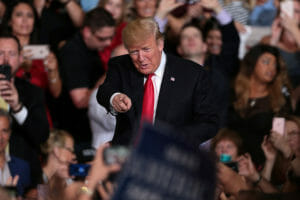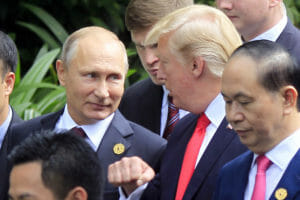Mandela’s Crucial Lesson for America — and the Republicans Who Never Learn
Beyond the eulogies bestowed this week on the late and truly great Nelson Mandela -- a visionary, revolutionary and peacemaker -- there is much for Americans to learn from the story of his vexed relationship with our country.
Beyond the eulogies bestowed this week on the late and truly great Nelson Mandela — a visionary, revolutionary and peacemaker — there is much for Americans to learn from the story of his vexed relationship with our country. We will forget the mistakes perpetrated in dealing with him at our own peril.
To put it simply, the same Washington figures who so wrongly coddled Pretoria, South Africa’s apartheid regime three decades ago — people like Dick Cheney and the neoconservatives — now tell us, wrongly again, that the United States should abandon negotiations with Iran and continue the embargo of Cuba. (And, of course, these are the same experts, politicians and pundits who promoted war against Iraq while assuring us the invasion would be a cheap cakewalk.)
Back when the Reagan administration reversed former President Jimmy Carter’s policy of pressure on the white government of South Africa, the Republicans explained that the African National Congress was merely a group of Marxist terrorists. Besides, the white Afrikaners were friendly to the United States as a matter of geopolitics, if not democratic principle, and their mineral wealth argued for them even more loudly.
Yet long before sanctions finally passed over Ronald Reagan’s veto and right-wing opposition, any serious analyst could see the white South African government, like all of the old colonial regimes in Africa, was inevitably doomed. In the eyes of the world, if not Washington, the ANC was no more “terrorist” than the perpetrators of the Sharpeville massacre, while the liberation army’s bombings had far greater moral justification than apartheid’s murders, tortures and everyday oppression.
Indeed, Mandela and his movement were seen as the legitimate voice of South Africa’s black majority by civilized governments on every continent, including many of our traditional allies. By the time the United States finally passed South African sanctions, similar boycotts had been legislated in dozens of other countries — which was why they ultimately worked.
Without sanctions, the Reaganites had no realistic plan for defusing the explosive, potentially tragic situation in South Africa, and no methods of cooperation with the world community that sought a peaceful transition there. Behind a fig leaf policy called “constructive engagement,” they instead seemed to believe they could sustain the unsustainable, perhaps indefinitely.
Such policy illusions were not only morally flawed but strategically stupid, risking the permanent mistrust of the African people, whose continent has since become so vital to the planet’s economic and environmental future. Fortunately, the Clinton administration persistently engaged with Africa — and specifically with Mandela — in ways that helped to heal that ugly breach. It is a project that former President Bill Clinton, former Secretary of State Hillary Clinton and Chelsea Clinton, in her role at their family foundation, have continued to energetically pursue.
The lessons of the South African experience can be applied to Iran and Cuba, whose relations with the United States are suddenly drawing renewed attention. In both cases, economic sanctions have been a central factor in policy — and in both cases, the success or failure of sanctions has hinged entirely on international cooperation, not American unilateralism (or “exceptionalism,” as it is now fashionably misnamed on the right). But the right-wing attitude, as usual, is to brush aside world opinion.
The outcomes to date are plain and undeniable.
Long ago, the rest of the world rejected U.S. sanctions against Cuba with a predictable result: The Castro government has remained securely in power for more than 50 years, despite the retirement of Fidel, while nimbly using the sanctions as an excuse for its own economic failures and human rights violations. Conservative resistance to broader engagement with Havana is only damaging American diplomatic and commercial interests, with negative effects that will long outlast communism on the island.
With Iran, the stakes are even higher, threatening the stability of the Persian Gulf and the entire Middle East. Again, sanctions have worked only because the Obama administration managed to mobilize the industrialized nations as a bloc to prevent the mullahs from gaining nuclear weapons. Conservatives in Congress who would tighten those sanctions now — ruining the potential for a successful deal, alienating the Iranian public and destroying the international alliance — have shown that they have no conception of how global diplomacy actually functions.
Like their predecessors, who insisted on spurning Mandela and isolating Cuba, the neoconservatives are too incompetent and narrow-minded to manage American foreign policy on a planet where cooperation is imperative and unilateralism doesn’t work. We should be grateful that the grown-ups are still in charge — at least for now.
© 2013 CREATORS.COM
Your support matters…Independent journalism is under threat and overshadowed by heavily funded mainstream media.
You can help level the playing field. Become a member.
Your tax-deductible contribution keeps us digging beneath the headlines to give you thought-provoking, investigative reporting and analysis that unearths what's really happening- without compromise.
Give today to support our courageous, independent journalists.




You need to be a supporter to comment.
There are currently no responses to this article.
Be the first to respond.